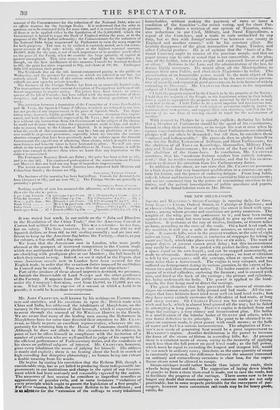Mr. JOHN CRAWFURD, well known by his writings on Eastern
man- ners and statistics, and his exertions to open the British trade with China and India, has addressed the inhabitants of Marylebone, on the vacancy in the representation of their borough, which is expected soon to occur through the removal of Sir Wila.tam horse to the Bench. We are aware that litany of the leading men among the Reformers in Marylebone have for some tittle directed their attention to Mr. Claw- Jean, as likely to prove an excellent representative, whenever the op- portunity for returning hint to the House of Commons should arrive. Although he does not allude to this circumstance in his address, in point of fact he offers himself in coniplitmee with the invitation of a number of gentlemen who are well qualified to judge of his capacity for the efficient performance of Parliamentary duties, und the soundness of his views on political subjects of interest. Mr. CRAWFURD, however, gives every' inhabitant the means of judging for himself. His address is manly and explicit ; there is no beating about the bush in search of high-sounding but deceptive phraseology ; no human being can extract a double meaning from his words. Ile begins by stating his conviction that the Reform Bill, though a considerable step, has as yet failed in producing those indispensable im- ptovetnents in our institutions and change in the spirit of our Govern- ment which had been anxiously and reasonably expected by the nation. The measures of last session he considers as imperfect remedies or aggravations of popular evils, and in some instances "violations of every principle which ought to govern the legislation of a free people." For esese reasons, he holds the recent Reform to be insufficient ; and ii an advoe rte for the "extension of the suffnsge to every inhabitant householder, without making the payment of rates or taxes a condition of the franchise "—for secret voting, and for short Par-
liaments. To obtain a revision of our system of Taxation, exten- sive reductions in our Civil, Military, and Naval Expenditure, a repeal of the Corn-laws, and a trade in corn unshackled by any duty, but as free with foreign nations "as between one county in
England and another county," will be his constant effort. He heartily disapproves of the great monopolies of Sugar, Timber, and
other I 'olonial produce. He is of opinion that the "basis of a Na- tional Currency ought to consist of the precious metals, and that no paper money can be safe or sound that is not convertible, at the plea- sure of the holder, into a given weight and expressed fineness of gold or silver." Reforms in the Law, and the administration of the law, he deems highly necessary. lie would allow all the Mullicipalities to manage their own Police, mid elect their Magistrates by ballot. The preservation of an honourable peace, would be the main object of his Foreign policy. Considering Education to be the most certain preven- tive of anarchy and support of good government, he is in favour of widely extending its blessings. Mr. Cttawreuo then comes to the important subject of Church Reform.
" I hold the ptoperty enjoyed by the Church to be the property of the Nation : I hold that the majority of the People, or the Legislature acting in their behalf, have a right to appi opriate the property now possessed by the Church as may seem best to them. I hold Tithes to be a most impolitic and mischievous tax. I hold that the communicants of each religious persuasion ought in justice to maintain their own pastors, and support their own churches; and that the fol- lowers i.f no one form of worship should be taxed for the maintenance of another.-
With respect to Pledges he is equally explicit ; declaring his belief that a Member of Parliament should be the agent of his constituents, bound to obey their instructions, or to resign his scat at once when he
cannot conscientiously obey them. When short Parliaments are obtained, pledges will not often be demanded ; but till then, he considers them " rational and indispensable." He proceeds then to pledge himself to vote for the Ballot, Extension of Suffrage, and Short Parliaments; for the abolition of all Taxes on Knowledge, Monopolies, Military Flog- ging and Naval Impressment ; for a reform of the Law of Libel, and the abolition of the Game-laws. In conclusion, Mr. CR AWFURD locutions, that his " moderate fortune renders him entirely indepen- dent ;" that he resides constantly in London, and that he has no occu- pation to distract his attention from his Parliamentary duties.
In addition to the above, we can state that Mr. Cnaweren possesses in a high degree that very important qualification in a senator—an apti- tude for labour, and the power of enduring fatigue. From long habit, indeed, labour and business have become essential to him as eejoyments; and we are convinced that in the points of unremitting attention to his duties. and the patient investigation of public questions and papers, he will not be found inferior even to Mr. Hume.






















 Previous page
Previous page